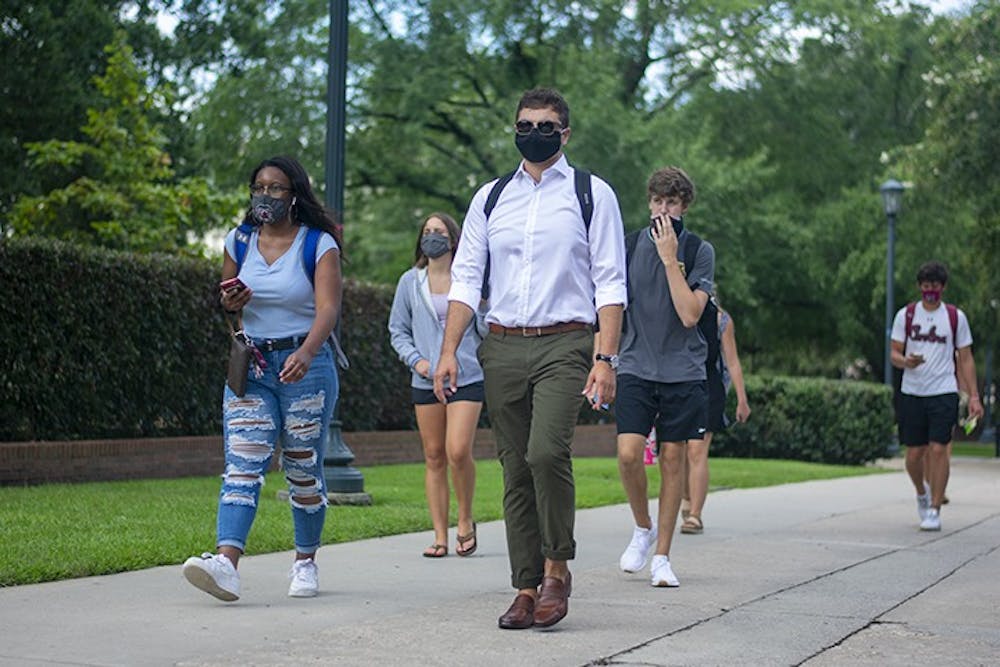Since last March, students have been confronted with a new set of challenges to navigate as a result of COVID-19.
The Daily Gamecock interviewed 40 students to learn how COVID-19 has impacted them and their campus life. Many experienced long periods of isolation, lower motivation, a more restrictive social life and higher levels of stress, among other things.
For some, COVID-19 reduced their level of human interaction significantly. Yehor Shtanko, a second-year international business and economics student from Ukraine, had to deal with long stretches of isolation.
“Since I could not go back to my country, I stayed here on campus. There was no family, no friends, no students, nothing,” Shtanko said. “I was technically alone 5,000 miles away from home, and that’s one of the hardest moments of my life.”
Catherine Delair, a second-year operations and supply chain student, was forced to isolate after both of her roommates tested positive for COVID-19. Even though Delair didn't test positive, she still had to complete the 14-day quarantine.
“I felt very trapped, and it was hard to be productive,” Delair said. “I kind of just keep doing school work. It was a lot of that, a lot of just sitting in my room watching Netflix, and it was hard because we couldn’t even go to the grocery store, so we ran out of food.”
Motivation was an issue for many students with online classes.
“Waking up and getting on your computer — you're not going to comprehend anything after that because you're so tired. You need to get up, take a shower, you need to go into a room where there's a bunch of other people that want to learn too, and they’re all encouraging you to learn,” third-year computer science student Charles Middeton said.
Second-year biomedical engineering student Conor Mangan said he spent too much time with the same group of friends.
“I've definitely spent way too much time with them. It’s like I don't even like them as much anymore, honestly. It's just like, I don't know, it's weird. It feels — it just doesn't feel right, socially,” Mangan said.
On the other hand, Julius Neubig, a fourth-year economics and supply chain student, said he had an easier time adapting his social life.
“I’m more comfortable with risk and going out so like, I hang out more with my friends who go out,” Neubig said.
The pandemic had an impact on the campus atmosphere, students said.
"Campus life doesn't really feel like campus," third-year sport management student Andrew Curry said.
Going to socially distanced football games was strange, Allision Hart, second-year international business and finance student, said.
“Seeing a space like that — that’s supposed to be packed — just empty, is really weird,” Hart said.
Another change the university made was to substitute the traditional spring break with five wellness days throughout the semester. Most students didn't find the wellness days very helpful. Fourth-year accounting student Nick Fiouris, who only has class on Mondays and Wednesdays, said the wellness days were useless for him.
“I can not go to class on any given day and can watch the lecture afterwards," Fiouris said. "All my due dates are the same and that’s the only thing really matters.”
Fourth-year nursing student Alexis Todd said she would have preferred a spring break.
“I’m still doing my work on the wellness day, so I don’t really get wellness days,” Todd said.
First-year information science student Victoria Roberts transferred to USC this semester and said feels she's missing out on a lot because of COVID-19 when it comes to her first year experience, which USC is ranked as having one of the best.
“With the clubs I’m in, like Greek life, not getting to do the formals and the fundraisers that everyone gets to do — that’s just been really hard," Roberts said.
However, first-year psychology student Katrina Schlekat and first-year exercise science student Desiree Solenberger said their first year experience exceeded their expectations.
“I’m from near outside Chicago, so a lot of my friends go to school in, like, northern states where the restrictions are very high on their campuses,” Strolenberger said. “We’ve been able to do, like, activities in-person somewhat, like I can still dance in-person with people, which is something I definitely couldn’t do if I was at another school.”

